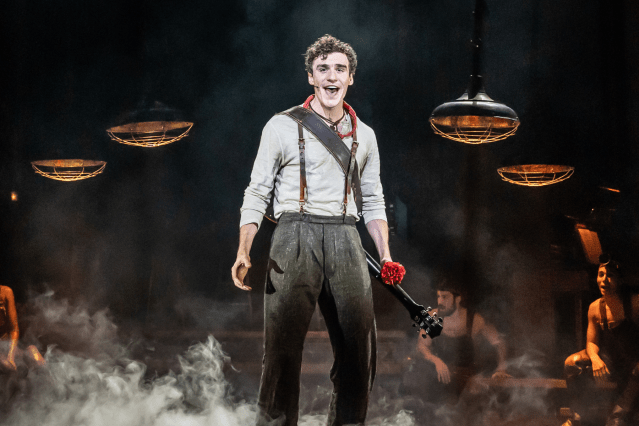Orpheus in the Underworld
Best known for its high-kicking can-can, Offenbach’s Orpheus in the Underworld – just over 150 years old – was originally a scurrilous political satire, in the same way as Gilbert and Sullivan tore into Victorian hypocrisy. Unfortunately for G&S the most prevalent performing tradition has preserved their comic operas in aspic, but the much rarer outings for Offenbach do not have such impediments, even if the satirical swipes – not only at operatic style (like Gluck, which Offenbach actually quotes from), but also the traditions of Comédie Française acting and scandals of the Second Empire – may be less than clear nowadays.
However, I can’t fathom director Tom Hawkes’ decision to frame the comedy for Opera Holland Park’s first ever production of the operetta in a muddled cinematic milieu, especially as we had a German director on hand (Max Reinhardt, perhaps?). I can’t imagine this character appears in Jeremy Sams’ translation – typically fresh and witty; there’s no reference in the programme to the character (although he is played by John Lofthouse, transmuting later into John Styx) and there’s no real development to suggest there’s a cohesive reason for his introduction. The unveiling of the Paramount/Columbia mountain top for the scene in Olympus is quite clever, but the change to what looks like a cave for Hades is much weaker.
The Hollywood theme is unclear elsewhere. Are Ian Caddy’s Jupiter’s relatives meant to be real starlets (Lana Turner, Bette Davis, Ingrid Bergman and the like)? And was Daniel Broad’s Pluto meant to be a centenary tribute to swashbuckler Errol Flynn? None of this was immediately apparent. Jeni Bern’s Eurydice seemed to have stepped out of the East End’s Queen Vic when she talked (though thankfully not when she sang). Given that Jupiter attempts to woo her as a fly, buzzing about, should we assume she was meant to be Zzzz Zzzz Gabor? Who knows?
Aside from that, what can sometimes seem a convoluted plot was, paradoxically, quite clear. Given in its original two-act form, it passes by genially enough, although I suspect less (concept) would have meant so much more (a rounded performance). I did like the City of London Sinfonia’s collective donning of horns for the second act in Hades; and conductor John Owen Edwards played ball by changing into a devilishly red smoking jacket!
The can can dancers came off best, as they were left as Offenbach would have recognised them, though he would have been puzzled by the gay leather boys and rubber clad sex kittens who also seemed a permanent fixture of Pluto’s underworld. Even the dancing gold Oscar looks rather tacky. Orpheus, here the rather David Cameron-esque Benjamin Segal, is hardly given enough to warrant his titular status; indeed convention was thrown to the wind (or, should I say, left on the cutting room floor) and he didn’t even get the final bow; even the camp clapper boy (unaccredited) did better than that.
The audiences were determined to have a good time and the evening was as glorious as London can provide in summer, but take away the carefree nature of the surroundings, the production would be found more seriously wanting. It may well settle, but Tom Hawke’s Orpheus isn’t the Oscar winner it would like to think it is.
– Nick Breckenfield












